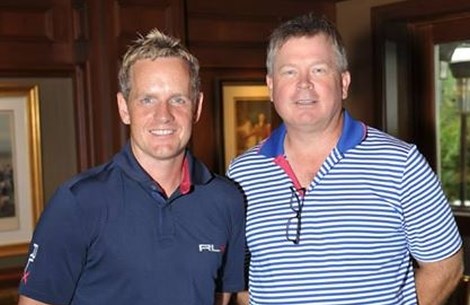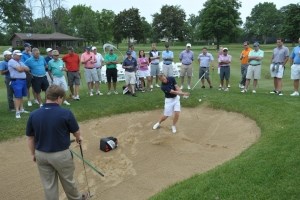EPi, Eric Olander and Luke Donald Pair Up For First Tee Program
Olander, Donald friendship spur EPi support of youth golf program

PGA Tour great Luke Donald and EPi President Eric Olander.
EPi-Electrochemical Products and President Eric Olander have teamed with with PGA Tour great Luke Donald to help with the First Tee of Greater Chicago, a program to assist students play golf.
EPi and Olander are financially supporting the First Tee of Greater Chicago, a youth development initiative of the World Golf Foundation that is supported by the leading organizations in golf including the Masters Tournament, LPGA, PGA of America, PGA TOUR and United States Golf Association.
Plus, Olander and struck up a friendship with Donald after attending a private wine tasting event with him. Here is the story on the First Tee of Greater Chicago website, which recently spotlighted EPi and Olander as a major supporter:
From the First Tee of Greater Chicago website:

Olander has attended the annual Taste of The First Tee for the past three years and has been a Birdie-Level sponsor for the past two years, enabling him to attend a private clinic with Donald prior to the wine tasting.
EPI has been in business for over 60 years and supplies customers worldwide with an extensive line of products in the areas of electroplating, metal blackening, corrosion inhibitors, antiquing and oxidizing, metal cleaners, metal brighteners, surface preparations, trivalent chromate finishes, and phosphate finishes. They have been a leader and innovator in the development and manufacturing of chemicals for the metal plating and metal finishing industries.
While their headquarters are just outside of Milwaukee in New Berlin, Wisconsin, Olander and his EPI colleagues make the trip down to the north shore every year for the wine tasting event as he has been a huge fan of Donald’s since he joined the tour.
“I admire his golf swing, creativity and development of golf shots, as he really is an artist on the course. Luke and his wife Diane provide so much leadership in the community with all that they give back,” said Olander.
We truly appreciate all that Eric and EPI have done to support The First Tee of Greater Chicago and look forward to continuing our partnership for years to come.
--
Related Content
-
NASF/AESF Foundation Research Project #122: Electrochemical Approaches to Treatment of PFAS in Plating Wastewater - 7th Quarterly Report
The NASF-AESF Foundation Research Board has selected a project on addressing the problem of PFAS and related chemicals in plating wastewater streams, studying PFAS destruction via electrooxidation and electrocoagulation. Our last report described the results from experiments of EO with a Magnéli phase Ti4O7 anode on the degradation of eight perfluoroalkyl acids (PFAAs). In this seven quarter report, we describe work to further explore how the degradation of different PFAAs are related to their molecular structures.
-
NASF/AESF Foundation Research Project #120: Electrochemical Destruction of Perfluorooctanesulfonate in Electroplating Wastewaters - April 2022-March 2023
This NASF-AESF Foundation research project report covers project work from April 2022 to March 2023 at the University of Illinois at Chicago. The overall objective of this work is to utilize a cost-effective reactive electrochemical membrane (REM) for the removal of PFAS from synthetic electroplating wastewater. Initial results for the oxidation of PFOA with three different catalysts are discussed.
-
Top 5 Areas to Consider Automation of Plating Operations
Automation for finishing operations can lead to improvements in process time, repeatability and consistency of quality. Yet, processes that make sense to explore for these operational efficiencies may not always be readily apparent.















